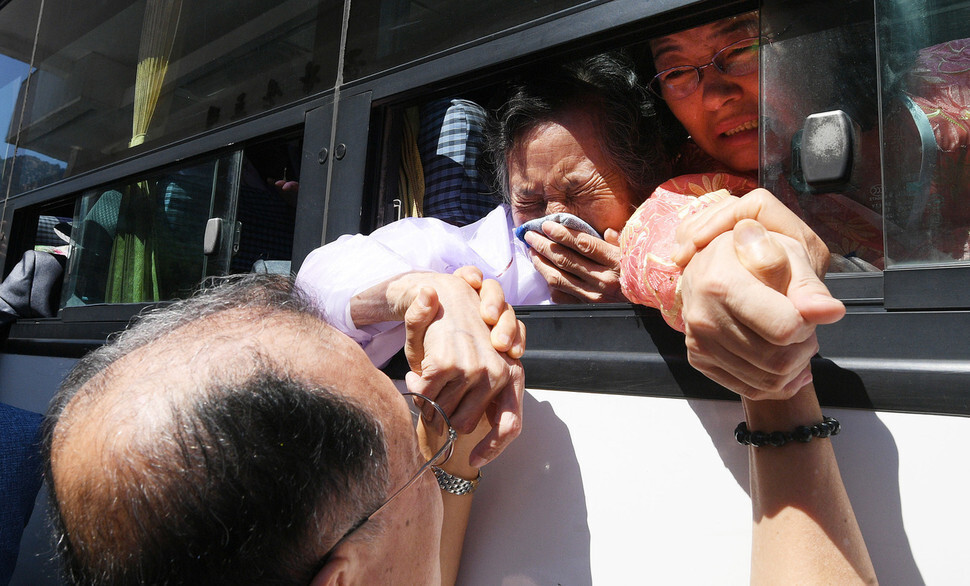hankyoreh
Links to other country sites 다른 나라 사이트 링크
S. Korea to link hometown visits for divided families with individual tourism to N. Korea

After South Korean President Moon Jae-in expressed his commitment to advancing inter-Korean relations in his New Year’s press conference on Jan. 14, while putting up a trial balloon about individual tourism, senior officials in his administration have come forward to elaborate his ideas.
“Individual tourism is not subject to UN sanctions,” said Kim Sang-jo, new chief of policy at the Blue House, during an appearance on KBS on Jan. 15. “This is something we can do at the current stage.”
“Among several areas, the government is focusing on the possibility of cooperating on inter-Korean tourism [including individual tourism],” said Unification Secretary Kim Yeon-chul.
Kim Eun-han, deputy spokesperson for the Unification Ministry, went a step further in the daily press briefing on Wednesday. “Provided that measures are taken to guarantee the safety of South Korean citizens, we could seriously consider allowing individual tourism. We’re looking into various possibilities related to this.”
The Unification Ministry has been internally reviewing the possibility of individual tourism to North Korea since Kim Yeun-chul’s appointment as unification minister in April 2019; more recently, officials there have been fleshing out a plan that would combine individual tourism with hometown visits by members of families divided by the Korean War.
On Dec. 31, 2019, the Unification Ministry announced that it would be “promoting new approaches, such as hometown visits,” as a way of promoting divided family interaction in the private sector. This announcement assumed that divided family members would be traveling with Chinese travel agencies or transiting through other countries on their way to visit hometowns in North Korea.
Individual tourism requires S. Korean amendments and US cooperationThere are quite a few issues that must be overcome. First, the North Korean government will have to agree to issue visas. Second, this will require the support of the South Korean public and the amendment of domestic laws. Third, Seoul will have to secure the cooperation of the US, which has been stressing international cooperation on sanctions against the North.
Seoul has its reasons for linking divided families and individual tourism. While tourism doesn’t fall under UN sanctions, combining it with the humanitarian issue of the divided families would provide more solid ground for easing the American government’s concerns about South Korea defecting from sanctions cooperation while also securing robust support from the public.
The critical question is whether North Korea will agree. The North has never issued a tourist visa to South Korean citizens trying to visit via another country without a formal government invitation. For individual tourism to be feasible, visas would need to be issued even when no invitation has been given. Since a visa itself presumes a guarantee of physical safety, the simple act of issuing visas could resolve concerns about safety.
Current law states that South Korean citizens who wish to visit the North must submit a “document confirming that an organization or government body in North Korea has issued an invitation” (Article 12, Clause 2, of the Enforcement Decree of the Inter-Korean Exchange and Cooperation Act) before their visit can be approved by the Minister of Unification.
In short, before divided family members can visit their hometowns in North Korea or individual tourism to the North can go ahead through visas alone, without invitations, there will have to be public or private deliberations between the South and North Korean governments, and South Korean law will also have to be amended.
By Lee Je-hun, senior staff writer
Please direct comments or questions to [english@hani.co.kr]

Editorial・opinion
![[Column] Season 2 of special prosecutor probe may be coming to Korea soon [Column] Season 2 of special prosecutor probe may be coming to Korea soon](https://flexible.img.hani.co.kr/flexible/normal/500/300/imgdb/original/2024/0426/3317141030699447.jpg) [Column] Season 2 of special prosecutor probe may be coming to Korea soon
[Column] Season 2 of special prosecutor probe may be coming to Korea soon![[Column] Park Geun-hye déjà vu in Yoon Suk-yeol [Column] Park Geun-hye déjà vu in Yoon Suk-yeol](https://flexible.img.hani.co.kr/flexible/normal/500/300/imgdb/original/2024/0424/651713945113788.jpg) [Column] Park Geun-hye déjà vu in Yoon Suk-yeol
[Column] Park Geun-hye déjà vu in Yoon Suk-yeol- [Editorial] New weight of N. Korea’s nuclear threats makes dialogue all the more urgent
- [Guest essay] The real reason Korea’s new right wants to dub Rhee a founding father
- [Column] ‘Choson’: Is it time we start referring to N. Korea in its own terms?
- [Editorial] Japan’s rewriting of history with Korea has gone too far
- [Column] The president’s questionable capacity for dialogue
- [Column] Are chaebol firms just pizza pies for families to divvy up as they please?
- [Column] Has Korea, too, crossed the Rubicon on China?
- [Correspondent’s column] In Japan’s alliance with US, echoes of its past alliances with UK
Most viewed articles
- 1‘We must say no’: Seoul defense chief on Korean, USFK involvement in hypothetical Taiwan crisis
- 2[Column] Season 2 of special prosecutor probe may be coming to Korea soon
- 3N. Korean delegation’s trip to Iran shows how Pyongyang is leveraging ties with Moscow
- 4Korea sees more deaths than births for 52nd consecutive month in February
- 5Amnesty notes ‘erosion’ of freedom of expression in Korea in annual human rights report
- 6[Reportage] On US campuses, student risk arrest as they call for divestment from Israel
- 7[Editorial] New weight of N. Korea’s nuclear threats makes dialogue all the more urgent
- 8‘Weddingflation’ breaks the bank for Korean couples-to-be
- 9[Column] Has Korea, too, crossed the Rubicon on China?
- 10[Column] Park Geun-hye déjà vu in Yoon Suk-yeol